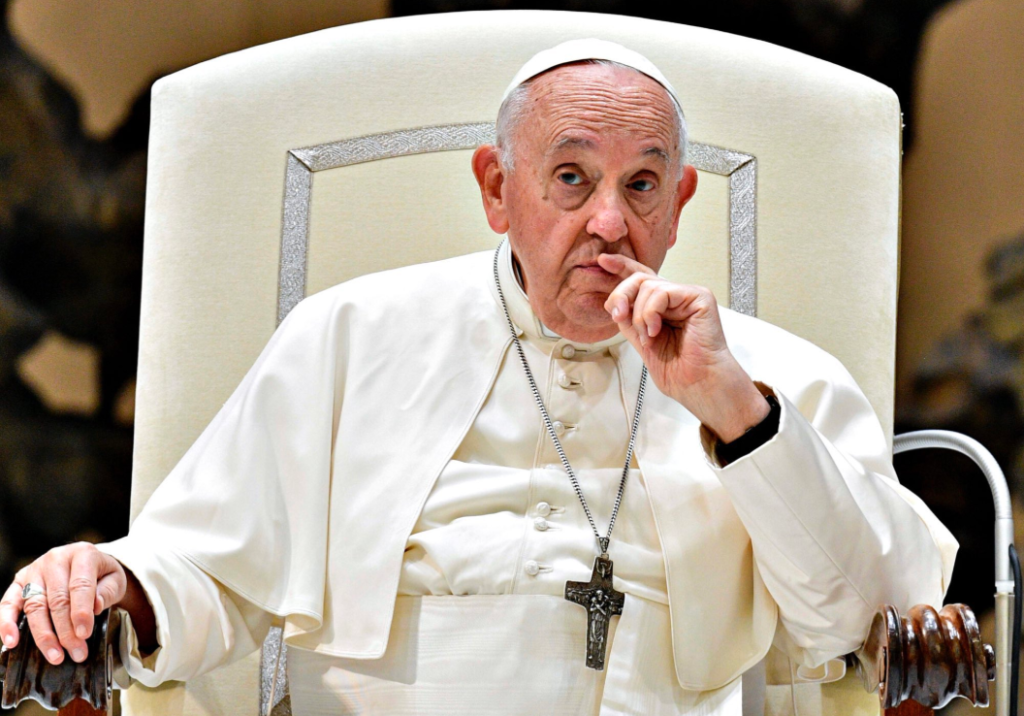Pope Awake and Stable: Receiving Oxygen After Respiratory Crisis, Rested Peacefully Overnight

Pope Francis Conscious but in Critical Condition Following Respiratory Crisis
Pope Francis is conscious but in critical condition, still receiving high-flow supplemental oxygen after suffering a serious respiratory crisis and receiving blood transfusions, the Vatican said on Sunday. The 88-year-old pope, who suffers from lung disease, is fighting a complex lung infection as his doctors closely monitor him.
Rainbow appears over Gemelli Hospital, where Pope Francis is hospitalized. Pray for the Pope ✝️ pic.twitter.com/lieAKuxyCl
— Trad West (@trad_west_) February 20, 2025
Vatican Updates on Pope’s Condition
In a short statement on Sunday morning, the Vatican said Francis had a quiet night and slept well. But the update did not say if he was out of bed or consuming food, information that had been included in previous reports. The Vatican later said the pope was alert, receiving oxygen, and receiving additional clinical tests, with a full medical bulletin to follow later in the day.
Pope’s Health Crisis: A Timeline of Events
Vatican physicians on Saturday announced that Pope Francis had experienced a prolonged asthmatic respiratory crisis as he was being treated for pneumonia. His critical condition was diagnosed, considering his pre-existing lung disease and frail health.
The pope was given “high flows” of oxygen through a nasal tube to support his breathing. Blood transfusions were also given after blood tests revealed low platelet counts, which can make a patient more likely to bleed and complicate their recovery. Otherwise, the Vatican said that Francis remained alert and spent most of the day sitting in an armchair, though in more discomfort than the day before.
Physicians estimated the prognosis as “reserved,” meaning uncertainty regarding his recovery, considering his age and pre-existing health conditions.
Pope Francis' health is critical. He's done more for human rights than any pope in my lifetime. I wish him a peaceful transition 🙏 😪 pic.twitter.com/LWn0bvbtc6
— Auntie Smartassy (@AuntSassyAss) February 22, 2025
Concerns Over Sepsis and Recovery Efforts
Among the biggest worries facing the pope’s medical staff is the possibility of the development of sepsis, an infection of the blood that could develop as a pneumonia complication. But to date, at least as of Friday, there was no evidence of sepsis, according to doctors, and Francis responded to his ongoing course of treatment, which consists of cortisone, antibiotics, and supplemental oxygen, as needed.
Additional tests on Saturday confirmed a low platelet level, a condition referred to as thrombocytopenia, which may be caused by infections or side effects of medication. Platelets are responsible for blood clotting and wound healing, and their drop may complicate the pope’s health even further.
Prayers and Masses Dedicated to Pope Francis
Pope Francis was set to celebrate Mass and ordain deacons at St. Peter’s Basilica on Sunday as part of the Vatican’s Holy Year commemoration. Instead, Archbishop Rino Fisichella presided over the Mass in the pope’s place, reciting special prayers for the pope’s recovery.
“Though he is lying in a hospital bed, we sense Pope Francis near us, we sense that he is among us,” Fisichella told the assembly, calling them to redouble their prayers for the pope’s healing and strength.
In a pre-recorded Sunday message, Francis assured his followers that he was “continuing hospitalization at Gemelli Hospital, continuing with the treatment that is needed; and rest is also part of the therapy!” His message also noted the anniversary of Russia’s invasion of Ukraine, describing it as “a painful and shameful occasion for the whole of humanity.”
Speculation on Possible Resignation
As Pope Francis fights health issues, rumors have returned about whether he would resign should his health continue to decline.
The Vatican has, however, brushed the rumors aside. Vatican secretary of state Cardinal Pietro Parolin spoke on the issue in an unusual interview with Corriere della Sera, explaining that resignation talks were “useless” when the attention should be on the pope’s health and recovery.
The Vatican also denied Italian press speculation that Vatican leaders secretly met with Francis at the hospital to weigh the law regarding papal resignations. Francis himself once indicated he had authored a resignation letter should he ever find himself medically unable to preside over the Church. Still, there is no canonical provision for addressing a pope who cannot carry out the responsibilities of office.
What’s Next for Pope Francis?
Pope Francis was hospitalized in Gemelli Hospital on February 14 after a week-long fight with bronchitis which worsened to a severe viral, bacterial, and fungal lung infection. Physicians have ordered total rest under close observation as he recovers.
As the Vatican awaits further medical updates, prayers continue worldwide for the pope’s well-being. His medical team remains cautious yet hopeful, emphasizing that the coming days will be crucial in determining his recovery.
You May Like: Blame Game on Ice: Hockey Fans Point Fingers at Trump for Team USA’s Loss to Canada




